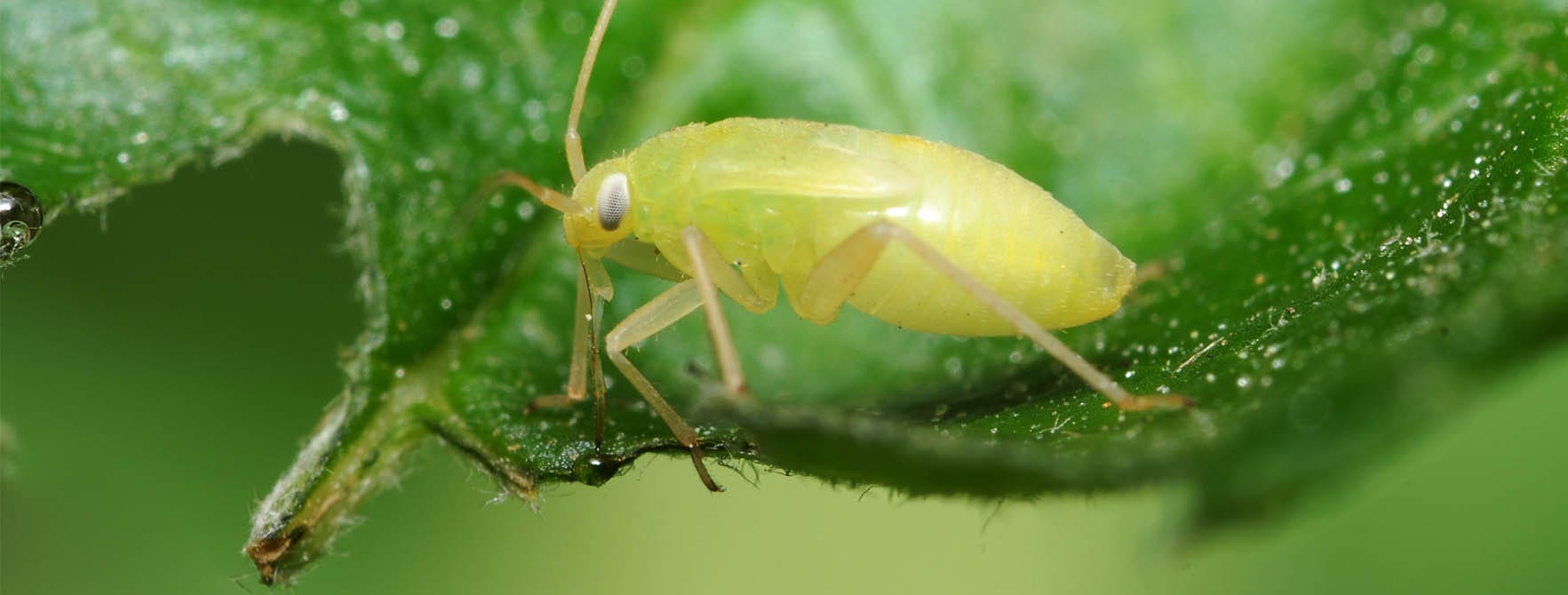
So... What's an Aphid?
Adult aphids have antennae, although they may or may not have wings. Even if they don’t have wings initially, aphids can develop wings when their host plant becomes too populated so they can move on to begin a new colony. They also have a proboscis, which looks like a long beak and functions similar to a straw. This is what the aphids and other true bugs use to suck the liquid from the plants.
These soft bodied, pear-shaped insects are very small, measuring 1/8" at most in length and are either green, yellow, orange, gray, black or white in appearance. Nymphs look very similar to adults.
They are somewhat fragile and can be squished or washed off their plant. Aphid control with soapy water is also a prevalent form of getting rid of them, though using a formula like Safer® Brand Insecticidal Soap is often a better option — its concentration is exactly what’s needed to control aphids without harming beneficial insects, plants, or the environment.
Reproduction Patterns of Aphids
The Aphid life cycle is between 1 week and 40 days; however, since they can reproduce very quickly, plants can become infested quite rapidly.
Aphids can also reproduce by parthenogenesis, where female aphids give birth to live female nymphs, bypassing the egg stage. This tends to happen during times of the year such as spring and summer, when food sources are abundant and large aphid populations can be easily accommodated.
Female aphids can have offspring at an amazing rate of 12 per day in warmer climates. These offspring mature and can bear offspring themselves in about a week or so.
Imagine if one aphid can have 80-90 offspring in a week, and at the end of that week, some of those offspring will be old enough to start bearing their own offspring, and a week later, some of those offspring will be old enough to start bearing their own offspring, and the cycle keeps going and going!
At that rate, it is easy to see how rapidly aphid populations can overrun a plant, possibly killing the younger plants or the newer growth on a plant. Generation upon generation can be produced each year by the tiny aphids. Fortunately, this rapid reproduction is kept in check by natural predators, environmental factors, and chemical controls.
Aphid's Habitat
There are numerous species of aphids found throughout North America. These garden pests are usually most active in the springtime and decrease with a rise in outside temperatures.
They live on plants, especially on the new plant growth and buds, and the eggs can survive the winter. Although aphids live in colonies, they will move to other plants when their host plant is dying or overpopulated.
Do Aphids Have a Benefit?
In many cases, "pests" have a positive side, but are there any benefits aphids provide? Aphids don’t help the plant itself, however, beneficial bugs like lady beetles and lacewings love feasting on aphids. Since lady beetles can eat many aphids per day, they can be attracted to and stay in your garden to help you keep the aphid population in check.
How to Identify Aphid Damage
Keeping a healthy organic garden can become a major issue if you have some of these pesky insects running around. Read more about how to identify these pests.
Aphids, also known as Plant Lice or Green Flies, infest both gardens and landscapes. Effective aphid control is essential for the overall health of your organic garden.
If certain plant roots are attacked by aphids, the plant may shrivel and die, particularly those of young plants or new growth.
Aphids prefer the bottoms of leaves rather than the top, and they are so small they can be difficult to see at a glance. It’s important to keep a watchful eye on your plants for signs of aphid damage, since the aphids themselves may not be visible.
Visible Symptoms of Aphid Damage
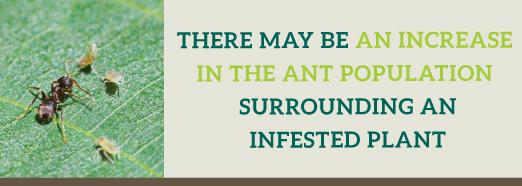
Even if you can’t see the aphids, they leave behind plenty of signs. Keep an eye out for some of the following indicators:
- Aphids produce a sweet, sticky excretion known as honeydew, and if you notice a substance on your plants that feels sticky, it may mean aphids are living on the plant.
- The honeydew secretion may turn black if it is affected by sooty mold fungus. The black spots that the fungus creates on the leaves will prevent the plant from absorbing the light it needs for photosynthesis. Without the ability to photosynthesize, the plant will eventually die. Sooty mold fungus thrives from the honeydew secretions of the aphids because the honeydew contains necessary ingredients like amino acids, protein, and sugar the fungus requires. If aphids have decided to call your plants home, it’s also a prime environment for this fungus to thrive.
- Leaves may curl and turn yellowish if there is a large infestation of aphids on a plant or tree. This is the time you will want to use a product such as Safer® Brand Insect Killing Soap for effective aphid control before they do more damage to your plant and garden.
- There may be an increase in the ant population surrounding an infested plant. Since the aphids’ honeydew is high in sugar, it attracts the ants to the plant. The ants feed off the honeydew secretions and actually protect the aphids from predators.
Results of an Aphid Infestation
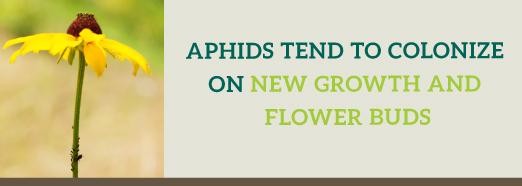
There are many different species of aphids, and some have affinities for specific types of plants. Regardless of which species is causing your aphid infestation, these pesky bugs can be detrimental to your plants. Here are some of the common results of an aphid infestation:
- When aphids devour the liquids from the plants, they also become carriers of any viruses the host plant may have. When the aphid moves to a different plant to begin a new colony, these viruses can be transmitted from one plant to another by the aphid. It only takes one aphid to transmit a virus to a plant, and the viruses can even be more detrimental than the aphids themselves.
- Plants may stop growing or have yellowing leaves. This can occur on any plant such as tomatoes, pumpkins, zucchini, beans, and more. Once the plant stops growing or its leaves begin to yellow, its yield won’t be as high. Like the name suggests, the rose aphid is particularly attracted to roses. Without aphid control on roses, they reproduce at a rapid rate and can cause bloom deformities as well as a reduction in the number and quality of blooms. Tomato plants are attractive to the potato and green peach aphids. While the plants can withstand a relatively high number of aphids before beginning to show symptoms, getting rid of aphids will protect the plant from withering leaves and a reduced tomato crop.
- If certain plant roots are attacked by aphids, the plant may shrivel and die, particularly those of young plants or new growth.
- Aphids deplete the plant’s fluids and nutrients from all parts, including leaves, stems, new growth, and flowers, so plant growth may also be impacted.
- Aphids tend to colonize on new growth and flower buds, so, flowers, buds, or new growth may appear stunted, distorted, or otherwise unhealthy.
- Larger plants and trees may be able to survive the onslaught of aphids with some damage, but they may not be quite as strong or productive as they were prior to the aphid infestation.
- The presence of honeydew may encourage the growth of fungi, such as sooty mold fungus and others which can cause further damage to your plants.
Natural Aphid Control Options
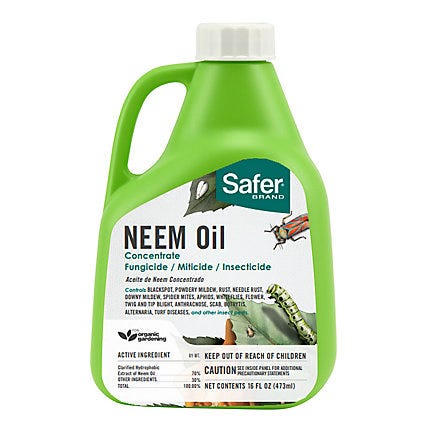
Aphids can be detrimental to your plants because they can transmit viruses, stunt new growth and flowers, and reduce crop yields. Their honeydew secretions, a byproduct of their consumption of plant fluids, can attract ants and create a hospitable environment for the formation of sooty mold fungus. If certain plant roots are attacked by aphids, the plant may shrivel and die, particularly those of young plants or new growth.
It's important to use a natural aphid killer for plants. While aphids are a nuisance, they also attract beneficial insects to your garden such as lady beetles and lacewings. Getting rid of aphids naturally can help protect the insects you want to keep around. On the other hand, an unnatural aphid killer can kill the beneficial insects that help your garden thrive.
While keeping an aphid problem in check before it gets out of control is preferable, even an infestation can be controlled by natural methods.
Getting Rid of Aphids using Natural & Organic Controls
Whether you need aphid control on roses or aphid control on tomatoes, Safer® Brand provides environmentally-friendly options for getting rid of aphids. The use of insecticidal soap such as Safer® Brand Insect Killing Soap and neem oil such as Safer® Brand Neem Oil are two excellent methods of aphid control.
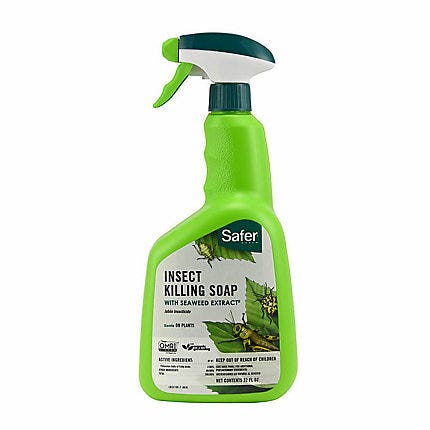
How Do They Work?
Insecticidal soap, made from potassium salt of fatty acids, works by penetrating and destroying the outer shell or membrane of the insect causing it to dehydrate and die. Safer® Brand Insect Killing Soap utilizes insecticidal soap and is the ideal product for effective aphid control.
Neem oil products work very effectively by suffocating the insect. Remember, when using Neem oil products, there is greater risk of phototoxicity (burning). Avoid using sulfur based fungicides within the active period (5 to 7 days) of the neem oil product. These two products combined greatly increase the risk of plant burn.
Safer® Brand offers a variety of aphid control products to help organically control and eliminate this garden pest and revive your plants. Products, such as Safer® Brand Insect Killing Soap and Safer® Brand Neem Oil, are the ideal resources for aphid control in your organic garden.
When Should I Use Aphid Control Products?

Since these formulas are contact killers and they do not persist in the environment, several applications may be needed for full control. Treating the plants anywhere between 5 to 7 days is ideal because it helps to eliminate any new aphids.
Insecticidal soap leaves no residue on plants, so they must be applied directly to the insects to kill them. When you’re applying the soap, you’ll want to make sure as much of the plant as possible is covered. Thoroughly wet the tops and undersides of the leaves to the point that they are dripping. You will also need to ensure any crevices between leaves, stems or flowers have the soap well-applied since aphids can congregate there as well. Insecticidal soaps often don’t damage plants, but be careful when spraying new growth or blooms as they can be extra sensitive. As a general rule, much like watering, do not use these products in the peak of the day or when temperatures exceed 90 degrees F to avoid wilting or browning of the leaves.
Why Choose a Natural Solution for Aphid Control?
Unlike traditional synthetic chemicals, you can use Safer® Brand Insect Killing Soap and Safer® Brand Neem Oil around children and pets. They break down into their natural elements within 7 to 10 days leaving no residual impact on the environment.
These aphid control options are highly preferable to chemical pesticides which can contain toxins that may kill beneficial insects and cause long-term detrimental effects on the environment. Pesticides are toxic to just about any living organism. In addition to the potential for killing beneficial insects in your garden, pesticides can be harmful or fatal to birds, deer and other wildlife. The use of chemical pesticides can create health problems for humans as well, including irritation to skin or eyes but also major problems like cancer and reproductive issues. Since pesticides are residual, they don’t break down when it rains or over time. This means they can eventually enter the water supply, rivers or streams. Pesticides can also remain in the soil, reducing the number of beneficial microorganisms and eliminating nutrients like phosphorus and nitrogen, which plants need to thrive.
Another negative effect of the chemical pesticides is the aphid's possible buildup of resistance to the chemicals in the pesticides. Even aphid control with soapy water, a popular DIY option, may damage plants or leave residue. This can make them less attractive to beneficial insects.
What Are Some Insects That Prey on Aphids?
There are several insects that eat aphids, and they may lend a hand if your aphid population is getting out of control.
Natural enemies of the aphid include lady beetles, lacewings, and parasitic wasps, so you want to find ways to attract them to your garden and keep them.
In addition to aphids, these beneficial, natural aphid predators feed on nectar and pollen. Some plants they find especially enticing include:
- Marigolds
- Caraway
- Chives
- Cosmos
- Fennel
- Dill
- Sweet Alyssum
The problem with natural predators is that if your organic garden doesn't provide an ideal location for them to live, they will not stick around. For the best in aphid control, partner these insects with a product like Safer® Brand Insecticidal Soap or Safer® Brand NEEM Oil® as they help control aphid infestations in your organic garden.
How Do These Natural Predators Help?
Lady beetles and lacewings find aphids to be a delicious delicacy, and they will devour them without hurting your plants.
Parasitic wasps lay their eggs inside the aphid's body eventually killing the host insect. Lure parasitic wasps to your garden by planting nectar or pollen producing plants. Partner these insects with effective aphid control products from Safer®, and you will have a healthy organic garden.
When Will They Appear?
Lady beetles, lacewings, and parasitic wasps will appear shortly after the aphids invade your garden.
These beneficial insects will appear only if there is a suitable habitat. Plant nectar or pollen producing plants as indicated by the temperature and climate zone of your area. Most greenhouses and garden centers can help you determine the right planting time for your area.

